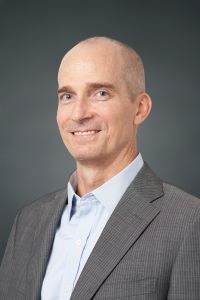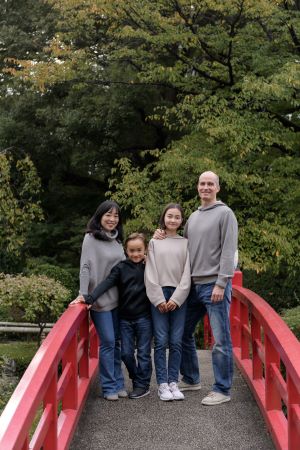Alumnus Abroad
Q&A with Ben Pratt '95
Where were you born? What do you consider your hometown?
90 km away from a small military base in northwest Bavaria, called Wildflecken. We moved back to the US about 3 months after I was born. So I have no recollection of Wildflecken except passing through on a family holiday when I was a teenager. We eventually settled in Williamsburg when I was 3 years old. The Burg is my hometown.
the US about 3 months after I was born. So I have no recollection of Wildflecken except passing through on a family holiday when I was a teenager. We eventually settled in Williamsburg when I was 3 years old. The Burg is my hometown.
Why did you choose to attend William & Mary?
The combination of highly regarded liberal arts education and a low in-state tuition couldn’t be beat. At the time, there was a budding Japanese language program in which I was interested. In hindsight, the Japanese course was a major inflection point for my life path and career.
What was your major? Did it prove useful in your future career(s)?
My major was East Asian Studies, focused on Japanese culture. The courses were beyond useful; they were the foundation of my career in Japan and international business.
Did you have a favorite course or professor while you were at W&M?
My Japanese teachers, Mariko Nakade and Lawrence Marceau, were a significant influence on the life path I took. They, along with the great teaching assistants, not only provided exposure to a culture outside of what’s typically found in Williamsburg, they created a fertile environment for nurturing long-term friendships.
Did you have a favorite memory or memories of your time at W&M?
The best times were associated with social fun and exploration. The strongest memories are of times with friends in Yates Hall, Reves Center dorm, the Japan House, Greene Leafe, Paul’s Deli, College Deli, and off-campus trips to music venues in Norfolk and Virginia Beach. Amazing musicians, including Sting, Tom Petty, Dave Matthews, Bruce Hornsby, came to campus during my youth.
Did you study abroad as an undergraduate? If so, where did you go – was it a W&M program?
My interests and academic focus were on Japan, and at the time, W&M’s Japanese program and network were budding. There were no existing sister-school programs I can remember, but we had the freedom to blaze new paths. I attended International Christian University in Tokyo for my junior year with financial support from the Japan-America Society. The experience was a major inflection point for me, and then I knew I would make my way back to Japan again. In my mind, I put a stake in the ground and told myself I would take a stab at making a living here, working with the language and cultural exposure that W&M afforded.
How do you think your experience at W&M has affected your life and decisions you have made?
The experience was fundamental to my life path. The exposure to cultures and concepts was the foundation for a broader goal to enter into international business in some way. Given my background and aspirations, I felt it important to first learn of and gain practical experience in a foreign country and then focus on business. The experience in one foreign culture established the framework and practical perspective from which I could more fluidly live and work with other cultures.
What are you currently doing professionally?
I’m co-founder and COO of HekaBio K.K. (www.heka.bio). We are a Tokyo-based healthcare innovation in-licensing and commercialization platform. Japan’s rapidly aging population demands the latest in technologies to support a high standard of health, yet medical device and pharmaceutical gap and lag (as compared to the US/EU) continue to worsen. Our team’s strong global network and intercultural business experience position us well to deliver on our motto, “Miracles through Partnership.”
How did you find yourself in the health technology (if that’s an apt term) field? Was it a specific intention or serendipity – or a combination of both?
While studying for my MBA in Marketing and Entrepreneurship at University of Southern California, a friend of mine asked if I would attend a biomed roundtable he was coordinating. That was where I met an HR manager from Edwards Lifesciences. They were recruiting their first interns after their spinoff from Baxter, and I was fortunate enough to take a position in the Business Intelligence Dept where my Japanese ability could also be helpful. I thought I might stay at Edwards for three years or so because I was keen to jump into the world of venture business. But, Edwards afforded many opportunities for growth, and three years turned into thirteen. During that time, I was able to make contributions in market research, new product marketing, strategy and operations in global as well as Japan region roles.
What about the field do you find engaging?
Directly contributing to saving, extending or dramatically improving the lives of thousands of people is quite fulfilling. Big wins feel very big, and the most difficult workdays are a little easier to tackle when I know I’m doing it for patients who greatly need the technology we bring to them. To me, it’s a career that’s hard to beat, and the cross-cultural aspect adds a greater sense of adventure.
From 1995-1997 you were a coordinator for international relations at the Japanese Ministry of Education. How did you get that job, and what did it entail?
My Japanese teacher at W&M told me about the JET program, to which I applied and interviewed through the Japanese embassy in Washington, D.C. At the time, approximately 3,000 college graduates from around the world were assigned to teach English in schools or manage international relations programs in city halls across Japan. I was in the program for 2 years in Hiroshima prefecture. I taught English at local schools, managed events promoting international understanding, and helped to manage sister-city relationships. I cherish the time lived in rural Hiroshima. It was true exposure to Japan outside of gigantic Tokyo.
Do you have any current projects/passions you would like to tell us about?
I have had an affinity for the ocean for as long as I can remember and have enjoyed surfing and windsurfing for decades. The common love of water sports has been a thread to lifelong friendships both in the US and abroad. More recently, I have added prone (surf) foiling and wing foiling to my water-based hobbies. These hydrofoil-based sports are very new to Japan and are not only an addictingly adrenalin rush; they draw people together. Whether when at the beach with fellow “foilers” or when approached by curious onlookers, it’s a natural conversation starter with folks I would otherwise very likely never meet. How fun is that?!
You’ve lived in Japan for many years now. Does it feel like home now or do you still feel connected to Williamsburg (or someplace else in the U.S.)?
connected to Williamsburg (or someplace else in the U.S.)?
I have lived in Japan for 24 years and am happy to call it a home. Williamsburg is my hometown, where I enjoy visiting family and friends, reconnecting with my roots. Otherwise, southern California is also a favorite place for me to live. There isn’t one place that meets all personal needs and preferences, but I’m fortunate enough to stay close to the people and places where I have lived over the years.
You have been a wonderful advocate for the Freeman Fellowship Program and its W&M students. When did you get involved in it? Are you currently hosting student interns this summer?
We have hosted interns from the Freeman Fellowship Program for 7 years, including through the COVID pandemic. Around 2016, I decided to become more active in W&M’s alumni program and started by coordinating a local gathering in Tokyo. Through interaction with W&M’s University Advancement Department, I was introduced to Prof. Stephen Sheehi who was leading the program at the time. I cannot express enough how impressed I have been by the program and interns who have contributed to HekaBio’s mission over the past few years. The level of intellect, analytical ability, and personability each intern has shown is inspirational.
Do you think international experience as a student is helpful in future life and career?
The college years are excellent for exploring faraway places and diving deep into less familiar cultures. It’s the first time in life when one can easily, safely manage travel alone and enjoy getting lost and reorienting. The international experience is as much a study of things foreign as it is a study of oneself and what humanity is all about. I think international experience is more important now than ever before.
Do you have any advice for current students?
Follow your heart, steeped in what inspires you
Find the biggest problem of interest, get close to it, and chip away at it
Show the best of humanity in your day-to-day interactions
Don’t take life too seriously.














